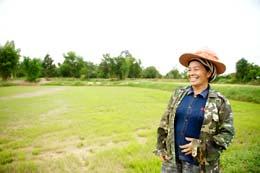Women in Asia lead the way in businesses to aid society

Across Asia women are re-examining society's problems through a business lens, playing a more leading role than women in other regions in harnessing the power of markets to tackle poverty and social ills, according to the first experts' poll on the best countries for social entrepreneurs.
The Thomson Reuters Foundation survey of the world's 45 biggest economies found the Philippines was the country where women fared best when taking into account representation in leadership roles in social enterprises and the gender pay gap.
In fact five other spots among the top 10 ranking in the poll of nearly 900 experts in social enterprise were in Asia - Malaysia, China, Hong Kong, Indonesia and Thailand.
Russia, Norway, and Canada rounded out the top 10, while Brazil came last and the United States fared badly in the perception poll due to concerns women are paid less than men.
Women interviewed across Asia described a fairer playing field and higher drive to put compassion over valuation as the reason women are doing so well as social entrepreneurs.
Overall the online poll, conducted between June 9 and July 15 in partnership with Deutsche Bank, the Global Social Entrepreneurship Network (GSEN) and UnLtd, foundations for social entrepreneurs, found 68 percent of experts said women are well represented in leadership in social enterprises.
A study by Deloitte in 2015 showed that women hold only 12 percent of the world's board seats while data from the Inter-Parliamentary Union shows women account for about 23 percent of all national parliamentarians.
However only 48 percent of experts said women in social enterprises were paid the same as men with the United States particularly concerned on this issue.
"Whereas men want to be like Mark Zuckerberg, women want to do well for the community," said Peetachai "Neil" Dejkraisak, who founded a rice social enterprise called Siam Organic with a female business school classmate.
"They are more compassionate and want a meaningful life ... Social entrepreneurs are inherently driven by improving people's lives, lifting people out of poverty. Women social entrepreneurs are better at doing this than their male counterparts."
Neil and Pornthida "Palmmy" Wongphatharakul began work on Siam Organic as business school students, not setting out with the aim of building a business seeking to improve society.
"The social impact was tied into the business model - the better the business, the more impact for the farmer," said Palmmy.
With Thai rice farmers earning about $12 per month per acre, they decided to home in on the U.S. market and innovations - mainly the organic purple "Jasberry" rice, high in antioxidants - to boost farmers' earnings and win health-conscious customers.
The company now works with 1,000 farmers and sold about 100 tonnes of its specialty rice in 2015 to Thai and U.S. buyers - and its farmers earn an average of $180 per month per acre.
"My objective has always been whatever you do, you always have to help the farmers you promised to help. When a decision comes along, you put the farmers first," said Palmmy, 31.
Indonesian former domestic worker Heni Sri Sundani never imagined she would become a social entrepreneur, using education to empower children and families in Indonesian villages.
From an impoverished farming family, in 2005 she went to Hong Kong as a maid to support her family but discovered her recruiter kept half her salary, inspiring her to use any spare time to study for a degree in entrepreneurial management.
At all the peace talks Joji Felicitas Pantoja attended in the conflict-troubled Philippines island of Mindanao, coffee was served to put people at ease.
But Pantoja soon realized talking about peace wasn't enough in communities unable to address basic needs like food and health, sparking an idea to use coffee as a vehicle for change.
Setting up "Coffee for Peace", Pantoja worked with Mindanao farmers to revitalize an industry long abandoned for cash crops like rubber and bananas - and her farmers' earnings tripled.
"Peace is not just the absence of war ... if we don't address the economic aspect, it's not complete," Pantoja, 56, a self-described peace builder said by Skype from Mindanao.
Malaysian Mastura Rashid realized it was not enough to give free food to the poor when she was a volunteer handing out meals to homeless people in Kuala Lumpur as this was not sustainable.
So she started working with urban families who earn under $250 a month last year, selling their home-cooked traditional coconut rice and spicy shrimp paste dish "nasi lemak" to office towers and petrol kiosks under "The Nasi Lemak Project".
"We want to help the poor by giving them direct access to the market. Malaysians love to eat, there is no other better product than nasi lemak," Mastura, 26, said.
Mastura said Malaysia's emerging social entrepreneur scene is competitive but a level playing field for women like her, unlike traditional businesses where women face discrimination.
Her project has received grants from two government-linked agencies set up to encourage innovation and startups.
"I don't see gender bias in social entrepreneurship - in politics or marriages, perhaps yes. There is no discrimination towards me as a woman social entrepreneur," Mastura added.
– Thomson Reuters Foundation






